
RURIK
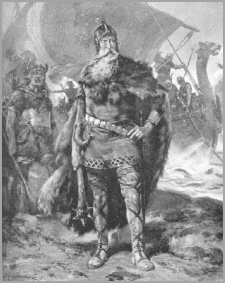
The leader of the Varangians was the semi-legendary warrior RURIK, who led his people in 862 to the city of Novgorod on the Volkhov River. Whether Rurik took the city by force or was invited to rule there, he certainly invested the city.
From Novgorod, Rurik's successor Oleg extended the power of the city southward. In 882, he gained control of Kiev, a Slavic city that had arisen along the Dnepr River around the 5th century. Oleg's attainment of rule over Kiev marked the first establishment of a unified, dynastic state in the region. Kiev became the center of a trade route between Scandinavia and Constantinople, and Kievan Rus', as the empire came to be known, flourished for the next three hundred years. While it is easy to think of the Vikings as barbarian hordes -- illiterate pagans raping and pillaging -- their ability to do what they did was critically dependent on developments in technology and organization that put them not far behind many of the more civilized people they attacked. Similarly, these advantages are most conspicuous where they encountered less developed peoples, which was certainly the case in Russia.
The Vikings who found their way from the Baltic to the Black seas through the Russian river systems came to be called "Varangians" but as they settled in the area, another name stuck: They were the Rus, which seems to be from an old Norse word, rothr, for "rowing-way," from which came the Finnish, Ruotsi, and Estonian, Rootsi, words for "Sweden." The Varangians/Russes got to Russia through their technology, the sailing ships that could actually take them to Greenland; but they came to rule the area through forms of large scale political organization that may have been rudimentary compared to Francia and Romania, but were beyond anything seen previously east of Moravia. "Rus" came to mean all the peoples encompassed by the state of the Russes.

VLADIMIR
(985-1015)

By 989, Oleg's great-grandson VLADIMIR I was ruler of a kingdom that extended to as far south as the Black Sea, the Caucasus Mountains, and the lower reaches of the Volga River.
It's capital was Kiev.
Having decided to establish a state religion, Vladimir carefully considered a number of available faiths and decided upon Greek Orthodoxy, thus allying himself with Constantinople and the West.
Vladimir composed the first law code for KIEV RUS. He unified his realm by making it a confederation with key cities in each region ruled by his sons. The princes were to move from city to city, working their way up to becoming prince of Kiev.
The system created frequent civil conflicts as the people of the key cities, from time to time, did not like the prince assigned to rule over them.

SVIATOPELK I
(980-1019)

Vladimir died in 1015. SVIATOPELK, the eldest son of his brother Yaropolk, who was Grand Duke of KIEV, succeded Vladimir at the head of the State. Married a daughter of Boleslaw the Brave, King of Poland, whose military support couldn’t prevent his eventual eviction from power. He tried to take over the cities or principalities of his younger brothers, Boris and Gleb. Following Gospel teaching, the younger brothers refused to go to war against their elder sibling. They were both murdered by Sviatopolk's soldiers. The Russian Church considers the brothers' innocent blood and sacrifice, for the sake of peace, in keeping with the example set forth by Christ. As a result, they were canonized, as was Vladimir.
Sviatopolk is known in history as "The Damned", or "The Wicked"
SVIATOPELK II
(1050-1113)

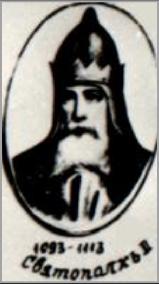
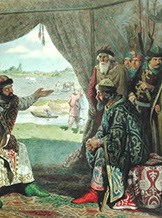
Grand son of SVIATOPELK I. Prince of Turow and of Pinks.
Son of Isiaslaw and Gertrude, Princess of Poland, daughter of Mieszko II. Grand Duke of Kiev from 1093 till his death in 1113. Famous for taking away the eyes of his brother Vassilko.
ALEXANDER
(1050-1113)
First mentioned in 1387 as SWIATOPOLK-CZETWERTYNSKI, after his estate called « Nowa Czetwertnia»
(Czetwertnia meaning « one fourth » or « quarter » )
An other branch took the name of « SWIATOPOLK-MIRSKI » .
In Poland, both families used the spelling «Swiatopelk»
GEDEON SWIATOPOLK-CZETWERTYNSKI
(d. 1690)
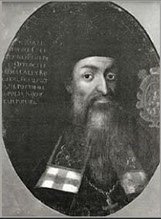
Orthodox Metropolite of KIEV. Severed the traditional organic link between the kievan church and the patriarchate of Constantinople by submitting to the patriarch of Moscow, a move that entailed profound political consequences.
As sign of appreciation, the Tzar offered him a golden tiara encrusted with precious stones and enameled medallions. (see photograph)
PRINCE ALEXANDER
SWIATOPOLK-CZETWERTYNSKI
(d. 1769)
One of the founders then chairman for a time of the « Bar Condfederation» opposed to the Russian influence in POLAND, particularly its anexionists projects.
President of the Sejmik (electoral assembly) of Braclaw (1756). Elected member of the Sejm (Senate) in1766.
Was instrumental in the election as King of Poland of Stanislaw Poniatowski of whom he remained a vigorous supporter in spite their differences regarding Russian intervention in Poland.
PRINCE ANTONI STANISLAW
SWIATOPOLK-CZETWERTYNSKI
(1748-1794)
Belonged to a ruined branch of the « STARA CZETWERTNIA » line. This may explain his ambition to reach a prominent financial as well as political position. Deputy to the «sejm » from the BRACLAW constituency, (1773-75) he defended first the partition of the country, provided it could keep a degree of political autonomy.
Later on, he refused to vote for the ratification of the country’s division and became member of the BAR CONFEDERATION favoring resistance to anexation.
In 1784 he managed to regain the confidence of the king who gave him a function at the court. Very soon however it appeared that he was in fact working with Szczesny Potocki one of the main polish allies of Moscow. In 1791, as senator from PRZEMYSK, he was the only member of the Senate to sign a manifest against the new liberal Constitution denounced by the autocratic Prussian and Russian rulers as a source of anarchy and a threat to the stability in the region.
He joined the « Confederation of Targowica » a league of conservative Poles who opposed the adoption of the Constitution of May 3, 1971 and, aided by Russian arms, began a war that culminated in the partition of Poland.
In 1794, during the Kosciuszko uprising, he was hanged by insurgents in a street of Warsaw.

PRINCE JANUSZ-TOMASZ
SWIATOPOLK-CZETWERTYNSKI
(1743-1813)
Castelan of Czernichow, supporter of the pretendant, then King Stanislaw Poniatowski who appointed him Chamberlain of the court in 1765 . In 1778 he became Senator of Braclaw.
Inspite of his conservative opinions, he didn’t oppose the new Constitution (called of "the 3rd of May") and didn’t join the «Confederation of Targowica » that called for Russian intervention.
PRINCE JANUSZ JOSEF
SWIATOPOLK-CZETWERTYNSKI
(1805-1837)
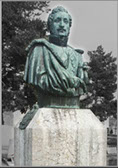
Graduated from the Military academy, specialized in artillery . Took part in the uprising of 1830 where he showed a great strategic talent. After the defeat of the insurgents and years of detention in a Prussian jail, he escapes and settles in France where he devoted himself to reflection and teaching on military subjects. With the support of the French military establishment, he created a teaching and training organization for polish officers in exile.
He published books and articles on the techniques of artillery, the use of steam as a source of energy in war and the military doctrines of the European powers.
Died in Tarbes on Nov. 29th 1837
PRINCE KALIKST
SWIATOPOLK-CZETWERTYNSKI
(1809-1888)
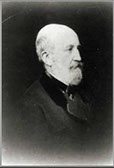
Grandson of Januz-Tomaz. Famous for his military abilities. He took part in the 1830 revolution against the Russian occupier. After its failure, he was banned from all public activities and retired to his lands.

PRINCE BORIS
SWIATOPOLK-CZETWERTYNSKI
(1849-1911)
Political thinker and social activist. Fought for the respect of human rights. Known for his involvment and financial support in favour of campaigns against mistreatment of indigenous populations in the "Independent State of Congo", under the Belgian King Leopold II.
PRINCE WLODZIMIERZ
SWIATOPOLK-CZETWERTYNSKI
(1837-1918)
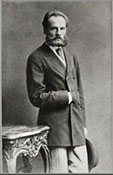
Was arested and deported to SIBERIA in 1863 for his action in a secret polish patriot’s organisation.
Thanks to interventions with TSAR ALEXANDER II by family members, he was eventually released and could return to POLAND. He married Countess MARIA URUSKA, and settled in one of her estates, MILANOW, where he has set up a remarquable library with archive fund and reconstituted a collection of family portraits.His wife became famous for her action in favor of the « uniats » persecuted on russian territory for remaining faithfull to the roman catholic church inspite of their practice of oriental liturgy, similar to that of the orthodox tradition.
Prince Wlodzimierz has shown to possess a great talent for business and managerial qualities which allowed him to rebuild a part of his former fortune that had been confiscated by the russians.
In 1886 his title of Prince was confirmed by the russian authorities and in 1902 he was appointed Chamberlain of the russian Court.
PRINCE SEWERYN
SWIATOPOLK-CZETWERTYNSKI
(1873-1945)
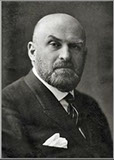
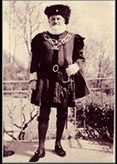
Eldest son of Wlodzimierz. Industrialist, politician and philantropist. Was a delegate to the Russian Douma (lower house of the imperial legislature) from 1906.
When Poland recovered its independence in 1919, he was elected to the Polish Parliament (1922-28) where he assumed the position of the Vice-Chairman of the chamber for several years. Very attached to the Catholic Church, he was granted the title of Chamberlain to the Pope.
Arrested by the Gestapo during the Second World War, he was sent to the concentration camp of Auschwitz where his younger brother Ludwik was also detained and killed.
At the end of the war, when the camp was liberated by allied forces, he was evacuated to Scotland, where he died in 1945.
PRINCE LUDWIK
SWIATOPOLK-CZETWERTYNSKI
(1877-1941)
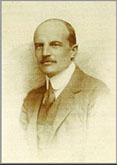
Younger son of Wlodzimierz and Countess Maria Uruska. Engineer in agronomy. Married in 1906 in Rome to Princess Rose Radziwill. Actively interested in improving productivity in agriculture, diversification of crops and education of peasants, principally in Eastern Polan (today Belarus).
He lived mainly on his 16,000 hectares estate called Zoludek, on the shores of the Niemen river. His new methods of management and resourcefulness inspired the economic development of the whole region (see "Europe transformed", a historic account by Norman Stone).
Prince Ludwik, however, had bad luck. His castle and lands were plundered, first by the Soviet revolutionaries, then by the German army invading the Soviet Union in 1942. Finally the Soviet Army took possession of his house to establish their headquarters.
Arrested by the NKVD at the beginning of the war, and deported with his wife to Russia, he was released after several months in prison thanks to the personal intervention of the Italiam court (Italy and Germany were at that moment allied with the Soviet Union).
A short time after returning to Polan, he was arrested by the Gestapo with his brother Seweryn, and sent to Auschwitz, where he was refused medical attention and died in 1941.
PRINCESS LUDWIK
SWIATOPOLK-CZETWERTYNSKA
(1884-1949)
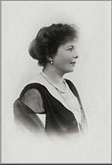
Born Princess Rose Radziwill.
Arrested with her husband in 1939 by the NKVD. She was deported to the U.S.S.R. and put in prison, but freed thanks to the intervention of the Italian monarchy. Back in Poland she suffered harassment from the Gestapo, then from the communist authorities after the war.
All her properties were confiscated.
She died in Belgium in 1949.
PRINCE WLODIMIERZ "PALO"
SWIATOPOLK-CZETWERTYNSKI
(1884-1949)

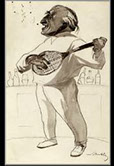
Son of Prince Wlodzimierz and of Countess Maria Uruska. Married to Marie Meaterno (1877-1939). Two sons : Stanislaw (1903-1983) and Roger (1908-1978).
Patron and co-founder of the "Chopin" music contest in Warsaw.
Died in exile in Beligum in 1951.
PRINCE STEFAN
SWIATOPOLK-CZETWERTYNSKI
(1910-1978)
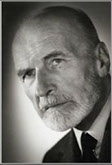
Younger son of Seweryn, married to Baroness Marie Greindl, with whom he had a daughter, Marie.
Prince Stefan was arrested in 1956 by the polish communist police, as an enemy of the State. Released from prison after two years, he married a Belgian lady, attached to the Belgian Embassy in Warsaw. Soon after she was declared "persona non grata" and obliged to leave the country, while he was refused a passport. He could eventually join his wife in Belgium, thanks to the intervention of the Belgian Minister of Foreign Affairs. From then on, he spent much of his time doing historical research, notably in the archives of the Italian Royal Family.

PRINCE GEORGES
SWIATOPOLK-CZETWERTYNSKI
(1907-1977)

Eldest son of Ludwik and Rose.
Studied Business Administration and Politics at the Universities of Louvain (Belgium) and Lausanne (Switzerland).
Back in Poland he entered the Home Office and was appointed Vice 'Starosta' (deputy prefect) of Gostyn, in Western Poland. In 1938, he created a company in Gdynia. A year later, when the war broke out, he was mobilised. Released after the defeat of the Polish army, which was unable to fight on two fronts after the Soviet invasion from the east, he was arrested without charges by the German Police and sent to Auschwitz.
In the course of the following three years, he was transferred to several other camps, including Dachau and Neuengamme in Germany. Finally he was sent to a forced labor camp in Normandy, along the French coast, where allied forces were expect to disembark on the continent. Taking advantage of an air raid, he managed to escape. Hidden for a while by friendly local farmers, he came across a French resistance group into which he was integrated. When the Second British Army set foot on French soil, he was incorporated into their ranks as a liaison officer. When the war ended, realizing it would be impossible to return to Poland, where communist security services were looking for him, he successfully brought his wife and eldest son Michel to Belgium, with the help of a Belgian diplomat, across the Iron Curtain that has just fallen on Europe.
He remained in Belgium until retirement. He had an active professional life, despite the marks of the war.
PRINCESS ROSE
SWIATOPOLK-CZETWERTYNSKA
(1909-1997)
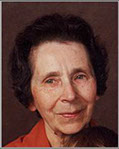
Born Countess Zoltowska.
Wife of Prince Georges Swiatopolk-Czetwertynski. Studied painting in Italy and France. She fled Poland in 1946 to escape communist persecution. Became a refugee in Belgium where she spent the rest of her life with her husband and four children.
PRINCE STANISLAW-TOMASZ
SWIATOPOLK-CZETWERTYNSKI
(1910-1998)
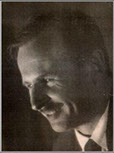
Second son of Prince Ludwik.
Studied agronomy in Belgium. He was married in 1933 to Baroness Ewa Von Buxhoevden.
During the occupation of Poland, he was arrested by the Gestapo and sent to Auschwitz, where he found his father among the prisoners, a short time before his death.
In 1954, accused of contacts with foreign agents and possession of dollar banknotes, he was sentenced to 8 years in prison. loss of civil and political rights, confiscation of all property. The strikes and protests of 1956 brought about a change in government and a relaxation of the repressive policy. Prince Stanislaw was released from jail, but, being branded as a former criminal, could not find any decent work in his country. He applied for an emigration passport and, with the support of the befriended Ambassdor of Canada in Warsaw, obtained a visa for himself and his whole family.
They were not allowed to carry any money or valuables out of the country, and left Poland penniless in September 1958.
Stanislaw settled in Montreal, where he brought up his six younger children. He took up different occupations, until illness obliged him to retire. He died in Rowdon in 1998.
PRINCESS MARIA-ELZBIETA "MISIA"
SWIATOPOLK-CZETWERTYNSKA
(1920-1984)
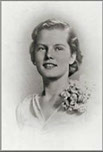
Youngest daughter of Ludwik Czetwertynski and Rose Radziwill. She was with her parents in Eastern Poland when the Soviet army invaded from the East in 1939, as agreed in the secret clauses of the Molotov-Ribbentrop pact. She managed to leave the country and went to France. Contrary to its engagements towards Poland, France had not entered into the war against Germany. She studied Medicine at the University of Grenoble, but was prevented from passing the final Doctorate exam because of the full occupation of France (initially, Germany had left the part of France south of the Loure unoccupied, known as the "free zone").
Misia then fled to England, where many Poles found refuge and served in the British Army.
She married a Polish pilot, Stefan Zantara. Two children were born : Terese and Andre. Unfortunately the union ended in divorce. After the war, Misia returned to the continent, and was married to Count Stefan Rostworowski, with whom she settled in France.
Having both lost everything in Poland, both of them found like in post-war France, suffering from a recession, far from easy. She found a job in a hospital, while resuming her unfinished studies. Eventually she got her degree and was able to set up a private practice. After having been persecuted and torn away from her family during the war, then deprived of her properties and sources of income by the communist regime in Poland, she dedicated her life to the relief of those who suffer, and achieved an almost heroic status among her patients.